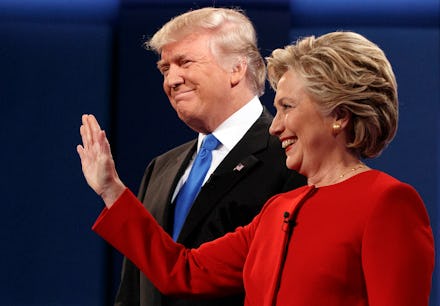Here are some scary similarities between the U.S. election and Brexit vote

One side prefers isolation from outsiders, and wants tighter borders. The other prefers the status quo — and believes inclusivity makes nations "stronger."
Sound familiar?
In fact, the upcoming United States presidential election has more in common with the United Kingdom's June "Brexit" vote to leave the European Union than you might realize.
Just as U.K. leaders were confident that voters would choose to stay in the E.U. ahead of the referendum, those in Democratic presidential nominee Hillary Clinton's camp are feeling pretty confident in her chances — particularly following Monday's first presidential debate. Nate Silver at FiveThirtyEight says her debate performance will "likely" earn her a bump in the polls.
But, just as the Brexit vote took investors and bettors by surprise, so too could an upset by Republican nominee Donald Trump.
Financial markets expected a "Remain" win in the U.K. Likewise, Wall Street seems bullish on Clinton: The stock market notched up Tuesday morning and the price of the peso (long seen as an elections bellwether, given Trump's tough talk on Mexico) also etched in Clinton's favor.
And, similar to how betting markets overwhelmingly predicted "Leave" would lose in Britain, speculators on the U.S. election have gotten especially bearish on Trump following the debate.
On the online prediction market Betfair, Clinton's odds improved from 63% to 69%, while Trump's odds swung from 39% to 31%, according to economist Justin Wolfers, who watched the debate while monitoring predictions in real time.
Those big swings are "highly unusual," Wolfers wrote in the New York Times, because a single debate only counts for a relatively small portion of a candidate's odds — and more important things like their temperament and policies are "already baked in."
"In general, we can expect betting markets to overreact to things," said Andrew Gelman, a professor of statistics and political science at Columbia University, in a phone interview with Mic about the presidential election.
Of course, we'll know more in the next few days, after current U.S. polls will be updated to show how Clinton's debate performance played out among voters.
But at least in the days leading up to the debate, polls were extremely close — much like polls right before the Brexit vote that showed the "Remain" and "Leave" camps "close to a dead heat," as the Economist put it. And, just as in previous election years, the first debate can be a poor predictor of who will win the election.
That's one reason the seeming confidence of betting markets in a Clinton victory could be misplaced.
Sure, Trump stumbled during the first debate, but it's hardly the first time he has said something vulgar in a nationally televised debate — and came out on top anyway.
Remember that on election day in the U.K., the betting markets put the odds of a victory for "Remain" at roughly 85% — even as polls began to tilt toward "Leave." Later that day, Britain voted to leave by a nearly four point margin.
Brexit also caught the financial markets off guard with a "decisive correction," or market dip, because traders didn't price in the possibility of an exit vote.
To be fair, there is a key difference, Gelman said, between the U.S. and the U.K. — diversity. That may help stand in the way of a Brexit replay.
"If you just think about who the working class are in this country, a lot of them are ethnic minorities who don't seem to be giving Trump a lot of support," Gelman said. By contrast, Britain is far whiter.
Still, the fact remains it's dangerous to believe you've got an election in the bag when you actually might not. Post-election research suggests that as many as 1.2 million people who voted for the Brexit regret their choice — more than enough to have tilted the outcome.
And, as was true of the Brexit vote in the U.K., young people comprise a crucial voting bloc in the upcoming U.S. election — and it is their futures at stake.